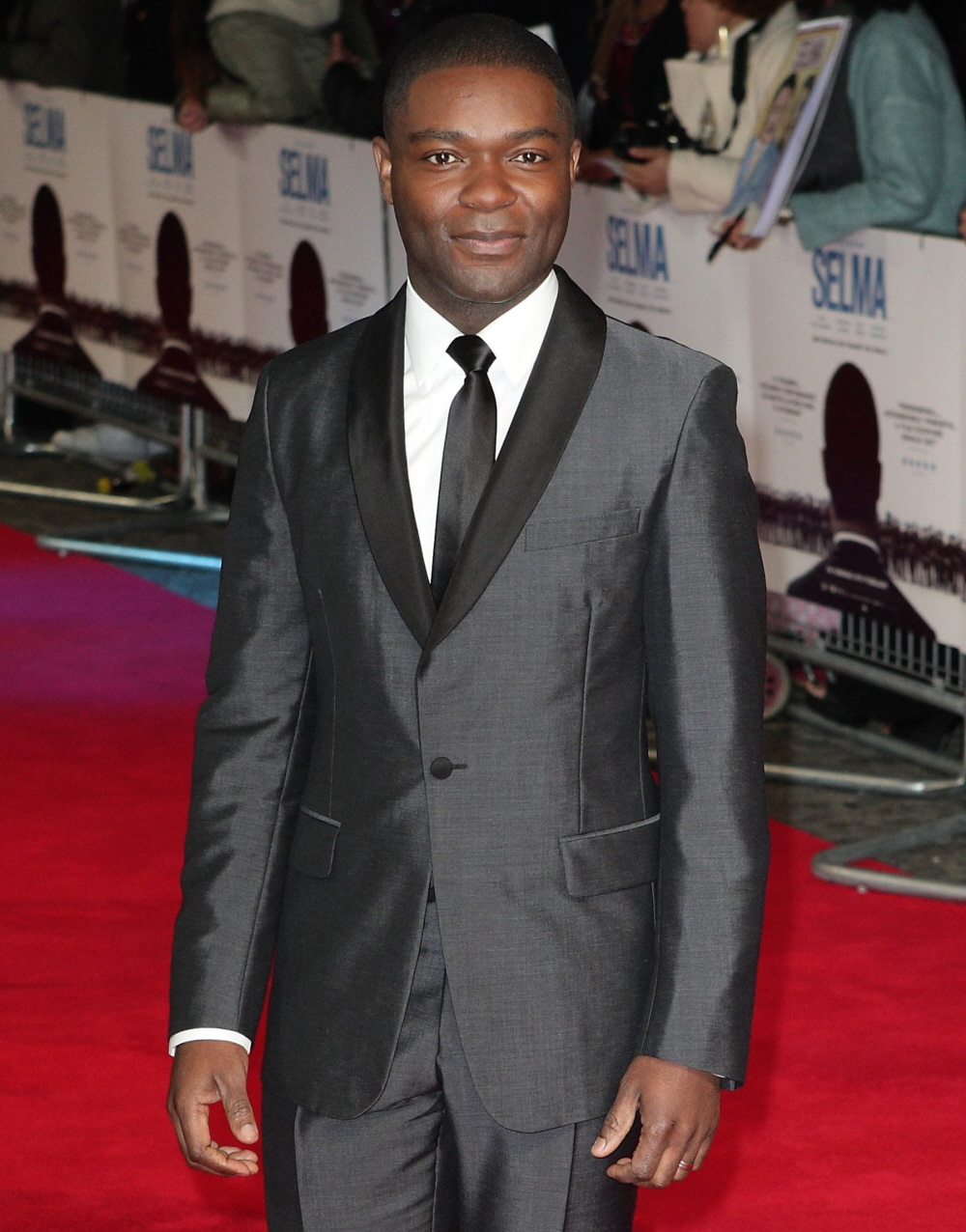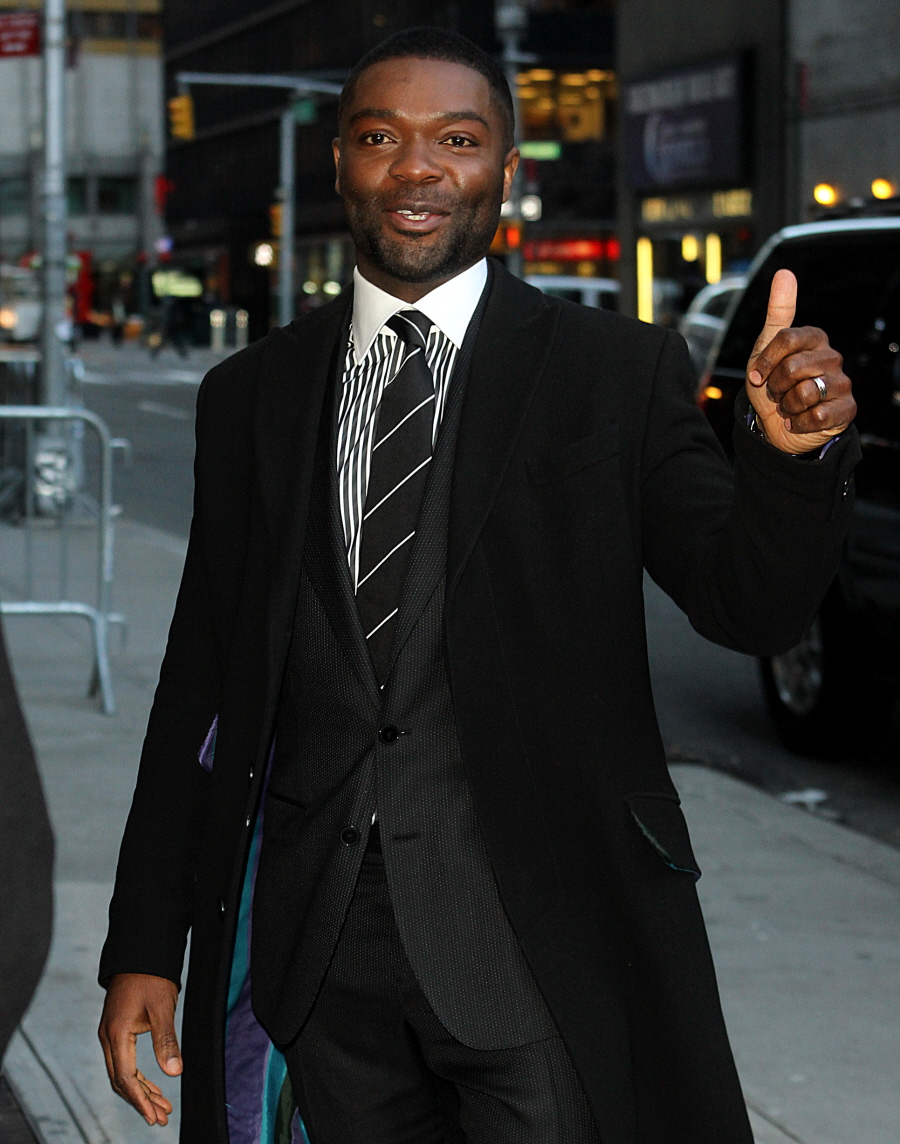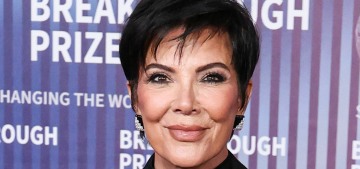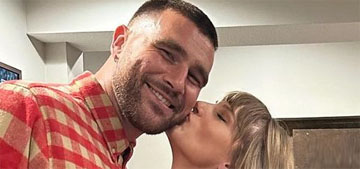Maybe I’m hellbent on making David Oyelowo “happen” on this blog. Maybe I just want Oyelowo to have more name-recognition overall. Maybe I want more people to see Selma and realize that Oyelowo was motherchucking ROBBED of an Oscar nomination. In any case, I’m not going to stop covering him, especially not when his interviews are so interesting and he’s unafraid of telling truth to the Hollywood powers that be. Oyelowo appeared at the Santa Barbara International Film Festival on Sunday for a sit-down conversation about Selma. He was asked specifically about Selma’s notable Oscar snubs (for Best Actor, Best Director, etc) and Oyelowo said that Hollywood only likes black people in films when they’re serving the white characters:
The evening’s moderator, Dave Karger, asked Oyelowo, “What is it like to be the subject of Oscar snub outrage? Are you like, ‘Yeah, people get angry that I wasn’t nominated’ or do you want to tell people ‘It’s OK, I’m gonna be all right.’ ”
Oyelowo says: “… No, look, historically — this is truly my feeling; I felt this before the situation we’re talking about and I feel it now — generally speaking, we, as black people, have been celebrated more for when we are subservient, when we are not being leaders or kings or being at the center of our own narrative.”
As evidence, Oyelowo argued that “Denzel Washington should have won for playing Malcolm X” and that Sidney Poitier should have won his Oscar for In the Heat of the Night rather than Lilies of the Field. “So this bears out what I’m saying,” the actor continued, “which is we’ve just got to come to the point whereby there isn’t a self-fulfilling prophecy — a notion of who black people are — that feeds into what we are celebrated as, not just in the Academy, but in life generally. We have been slaves, we have been domestic servants, we have been criminals, we have been all of those things. But we have been leaders, we have been kings, we have been those who changed the world.” The audience responded with applause.
Oyelowo continued, “Those films are so hard to get made. People have often said to me, ‘Why has it taken so long?’ I mean, [King] was assassinated almost 50 years ago. There has been no film where Dr. King has been the center of his own narrative until now. That’s because up until 12 Years a Slave and The Butler did so well, both critically and at the box office, films like this were told through the eyes of white protagonists because there is a fear of white guilt.”
He elaborated, “So you have a very nice white person who holds black people’s hands through their own narrative. We don’t want to see that pain again, so you don’t even go into what that pain was in an authentic way. Both of those things are patronizing to the audience. You can’t have people curating culture in this way when we need to see things in order to reform from them.”
I agree for the most part with Oyelowo, especially with how the Academy or Hollywood in general wants to treat stories about African-Americans. There is the explicit subservience of hiring black actors to play characters that are maids, cooks, butlers, etc. Then there is the implicit subservience of having the black characters only serve the white characters’ stories. I’m surprised he didn’t name-check the “magical” black character trope/stereotype, which also feeds into another Hollywood problem: that a black character must be the best, the most magical, the most wise, the most spiritual and devoid of any flaws or humanity whatsoever.
Now, all that being said… I do disagree with him about 12 Years a Slave. People complained that Brad Pitt’s character was the “white savior” of the film and that Solomon Northup was literally forced into servitude/slavery, but what I found refreshing about 12 Years was that from start to finish, it was Solomon’s story. Story-wise, the white characters supported Solomon’s narrative.
Photos courtesy of Fame/Flynet and WENN.


















12 Years a Slave was one of the hardest movies to watch.
I was delaying it for so long because I knew it would upset me but it was worse than I could have ever imagined. It was hard for me to enjoy anything about 12 Years a Slave. Even though it was a wonderfully acted and beautifully shot film, the brutality and disgusting nature of the white characters was just so overwhelming that it was hard to focus on anything else–but I guess that was why the film was so damn powerful.
I’m also watching Masters of Sex right now which does a good job of showing how poorly black people were treated in 1950s America.
I feel like 12 Years a Slave and MoS should be required viewing for white peeps who think black folks should just “get over it”.
Agree, especially with the last sentence.
Agree with everything you said.
Chiwetel Ejiofor was completely robbed for the Oscar too.
YAAASSSSSS!!!!! YAAASSSSSSS!!! Preach.
Yes. Agree, entirely. That’s all I have to say.
Oh, I second the Masters of Sex treatment. They didn’t let Libby become the white saviour at all and that’s what usually happens.
It’s a fine line between portraying a worthy white ally and slipping into the white saviour trope, which is where I find Hollywood so often falls down.
I was SO worried when they started that story line, because it could have easily gone in the white savior direction but they did a great job of having the Robert Franklin character school Libby on what her place is in working for Congress Of Racial Equality. I also like how Franklin’s fully in control and never relies on her at any point–even when he was confronted by a police officer, he never asks to be rescued. If anything, he seems way more centered and grounded as a person than Libby, who seems like a hot mess in comparison.
Some of the scenes in the black hospital where the brilliant Courtney B Vance tells Sheen’s character that he’s not allowed to exploit black people’s sexuality were also really important. I think that’s the first time I’ve seen the issue of white society’s hyper-sexualization of black people addressed on a TV show, and given the subject matter of the show itself, they really had a responsibility to talk about that.
Overall, I’m really enjoying MoS. I think the writers are really thoughtful in considering the portrayal of the black-white dynamic during the 1950s. They keep it truthful, but not sanctimonious or cloying like typical Hollywood, and none of the White Person Saves the Black Folks garbage that always makes me cringe.
Absolutely to all of that. It makes me think, “Look, guys. It IS possible. In fact, it’s not even difficult.”
It’s totally possible, but I think so many writers are lazy and uninspired. Also, truthfulness doesn’t always sell in Hollywood.
I also wanted to add that I appreciated that they exposed Libby’s insidious racist beliefs even while she desires to be part of the civil rights movement. When it comes to racism being shown through the Hwood lens, too often white characters are portrayed as either racist tyrants, or white superheroes without an ounce of prejudice, and never anything in-between. It’s great that the writers decided to show that contradiction.
Yes again. That’s the unusual thing: they depicted the white character LEARNING and being asked to examine her own attitudes, and to find them wanting.
I agree 12 Years was a bit hard to watch. Also along with 12 Years and MoS as required viewing they should throw in the one that came before and that’s “Roots”
Agreed. We watched it in High School.
I thought 12 Years a Slave wasn’t a great movie at all. There was a lot of sloppy story telling and too heavy a reliance on graphic violence and brutality. I also don’t jive with this notion that white people must see fill in the blank film to understand us when these films are largely us as slaves, butlers, villians, angry women, in Tyler Perry type written melodramas, or the oh so wonderful MLK Jr. because, let’s face it, that’s the range of our stereotyped tropes.
I am ready to see a movie by Black people starring mostly Black people that explores, discusses and celebrates our humanity in a sophisticated, Introspective manner, not a historical period piece, not some “Oh gurl, you betta git yo lyfe” quasi minstrel show.
But mainly, I wanted to say: I know it’s frustrating when people don’t get how your past cultural history effect your present day sense of self and community, but disparaging over when or how they will ever get it is a waste of time and energy. Their cultural history plays a large role in how they interpret things, too.
Fair enough, but just to clarify — I wasn’t saying that white people should see “fill in the blank movie” to get an idea of how black people are.
That wasn’t at all what I was saying.
I was simply saying that the horror of black slavery in America is something that should never be minimized or trivialized—some people could use a reminder.
I hear you on this one, JB. It’s in line with the discussion of how race always seems to be a factor in casting, like there can’t ever be a star of a movie, or even a sidekick, neighbor, etc., without a racial component – a detective who just happens to be black, versus a black detective, for example. It’s essentially stating all we ever can be on the big screen is the stereotypes we’re believed to be in real life, as though there simply isn’t anything more to our story than slavery, Jim Crow, and “go on sista gurl”.
I agree with you, why can’t we see black actors in movies when the character they play has nothing to do with them being black? I like Steve McQueen movies but let’s be honest, the one time he decided to make a movie about black folks they were slaves.
His comments remind me of that Shaka Zulu biopic from the 80s. The entire story, despite being a biopic about an african ruler who never met anybody white in his lifetime, is told via white dudes and their perspective.
It’s on youtube If anyone wants to see it. Not to be confused with the Michael Caine film ZULU whose events occurred long after Shaka’s death.
I vaguely remember that 80s series! I was a kid when it was on, but I remember my mother (who is from Punjab, India) was so furious by the POV. She banned anyone in the house from watching it.
Now I’m going to have to youtube it to see how cringeworthy it is.
It isn’t cringe worthy.
It’s an interesting point. I’m glad people are talking about it, perhaps giving more writers and directors the courage to do things differently.
Keep on speaking the truth Mr. Oyelowo.
Seriously. I don’t believe anyone could argue against the notion that Black people are more celebrated in today’s world when they are subservient.
I found the complaints about Brad Pitt’s character silly. He was there because that’s what happened! It’s a freaking true story!! If anything Hollywood probably would have preferred that Soloman stockpiled weapons and broke out in a big action sequence (hey that BS worked for Argo). I admire 12 Years for just telling its story.
His acting was just not on par with the others’ and I can’t believe he wanted to plug himself into that ridiculous role. Ruined the film for me. All of a sudden it ended, we were largely left to assume the course of events following their meeting…just a cheap ending
Sounds like this man’s perspective on the world in general has made him a little too quick to invent narratives. Creating Selma probably has him thinking even more along those lines. Unfortunately for his credibility, just looking at the list of black Oscar nominees disproves what he’s saying–most roles don’t even fit his categorization of ‘subservient’ versus ‘leading’ blacks. Stories and characters in film are much more nuanced than what he is trying to make fit in his box. Making such complaints after not being nominated is not very attractive.
*holds troll snacks out of reach*
No, no!
Lol. Are troll snacks made of disgust and outrage?
I’m not an Internet troll, I’m a real person, and these are my real opinions. I am a real feminist and a real defender of minorities, underdogs, the afflicted and the oppressed–but that doesn’t mean that people get a pass if what they are saying is illogical.
@Unmade Bed/Defender of the oppressed/minorities
Would you say that institutional racism in Hollywood is a real thing? Or is that an illogical belief also?
Racism, sexism, consumerism/materialism, etc. are all, unfortunately, institutionalized. I just don’t think what he’s saying, specifically, is accurate. It reads like sour grapes.
@Unmadebed “generally speaking we as black people have been celebrated more for when we are subservient, when we are not being leaders or kings, or being in the center or our own narrative driving it forward”
Note the use of the word “generally”, your disagreeing with him, based on your comments so far, is that it there are black people who have been celebrated in roles that couldn’t be defined as subservient. It’s “illogical” to shoot down his argument because you can name four actors off the top of your head who have been nominated/won for domineering roles.
Sorry to go off on a tangent, but I will say, however, that I think sexism and consumerism/materialism are much more prolific at this day and time than racism. Racism still exists, but the general population and the media are much more wary of degrading minorities than they are of women. Overall, the media is very careful with how they portray black people; but women are still treated like objects everywhere. Sometimes I think that’s because most women seem ok with it, or don’t even act like they notice it. Furthermore, society is more comfortable empowering blacks than women; a fact that is actually historically proven and institutionalized: African Americans got the right to vote long before women. America elected a black president before a female one.
At this point, black people have been given their platform and a social safety net for racial respect and empowerment, and it is primarily up to them to see it through.
“At this point black people”
Hmmm…I understand the lens through which you’re looking at the world but I also think you’re denying/ignoring several factors in order to make your narrative fit.
Obama got the lead because he was younger, better able to reach large audiences, and he was a new face. Hilary Clinton carried the issues of the Clinton brand behind her and had many struggles being that personable individual who could reach even the democrats who were iffy on her. Obama’s nomination and Hilary’s lack of nomination didn’t magically mean black people had it better. Both of them were evidence of the lingering issues of racism and sexism in this country with Obama being credited as ‘well spoken’ (for a black guy) and Hilary being admonished for not being softer.
I think the time and the issues were right for Obama, but hire suggesting that the system is now wonderfully set up to make things easier and better for black people and that’s just not true. It seems like a sheltered comment. If I do not experience something I don’t deny its existence for others. Go into ‘rough neighborhooda’ and ‘good schools’ and see what race relations are like. That ‘platform’ you speak of can become a cage.
Truly stop…and read stories where minorities are punished everyday for not confounding with European-based ideals of beauty and decorum. There’s been several women fired for daring to wear their natural hair after they were warned not to.
Amy – Black people were given the right to vote in America before women and a black person was elected president before a woman, regardless of why Obama was elected and Hillary Clinton was not. This is not my ‘narrative’. This is history’s ‘narrative’. None of what you said disputes that fact. You can’t turn my verbiage on me just because you think it’s clever.
I really do appreciate that you don’t deny the existence of what you don’t personally experience. I try to do the same. I recognize and have sympathy for the poverty that many black people experience. Do you really think that the white man is still holding the black man down though? Don’t employers just want their employees to look clean and neat (no tattoos or piercings, shaved/groomed beards, coifed hair, long enough skirts, no tank tops, etc.)?
This world is far from perfect, and there are still statistical disparities between different groups, but at some point black people have to start being the change they want to see in the world. I’m open to the idea that white men are funding the negative aspects of black culture, like rap, in order to keep black people down (just as they are obviously funding things like porn to keep women in their place), but I don’t see it. If someone knows otherwise, I’d love to be schooled on this.
Sorry, I’m probably not going to come back to this page. I’m tired of hearing myself talk on the subject. White men are, largely, entitled jerks, so I don’t really care to defend them. Also, I just remembered how many white people listen to and pay for gangsta rap, so I basically just schooled myself on that. Moral of the story: I just hate seeing black people pull the race card if they don’t succeed, unless it is 100-percent warranted. Black people and all women need to regain control of their own cultures in the media and build them up to be inspirational.
So, when you say that Black people were given the vote earlier, you mean 45 years later, yes?
Pepsi Presents…Coke – Black men were enfranchised by the 15th Amendment in 1870.
There’s a huge difference between the two and if word were bond there wouldn’t have to have been a Voting Rights Act. I don’t imagine a Black guy trying to register to vote would have met success in 1940.
“Regardless of why Obama was elected and Hilary was not”
In other words: I don’t want to analyze why something is, it’s enough that the single example fits my beliefs and I don’t want to question why this single example resulted in this way and not in the hundreds of other examples that exist.
So let’s not question Obama’s skin tone working for him better than if he were a darker skinned black male. Let’s not question those who’s comments revealed a level of racism and discrimination by lauding him as ‘well spoken’ on his own political party. Let’s not question the issues Hilary faced appealing to voters and other Democrats as well as the automatic discrimination she faced as a result of Bill’s actions that had nothing to do with her. Nope. Obama black. Hilary white. He man. She woman. Case closed discussion over.
I’m not turning your verbiage on you. I’m revealing the way people shut down discussions when others challenge their points. Even in science nothing is ever cut and dry and unworthy of discussion, but going on your reasoning many scientists would simply have said. “Well clearly this happens only because of this. Case closed fellas.
“Do you really think that the white man is really holding the black man down though?”
Yup! And I’ve got science on my side. See people actually did studies regarding quantifiable data and facts about various examples of race relations and they agree with that very question. White teachers are more likely to see minority students as more troubled even when it’s not true. Individuals with ethnic sounding names are more likely NOT to get phone calls returned for work applications. Well dressed and polite individuals are encouraged not to wear their natural hair in styles that are not ‘acceptable’ while no such instruction goes out to their co-workers with straight hair. Are there signs on doors saying, “No blacks allowed!” anymore? Nope, but honey the issue has become far more insidious and troublesome since then. Just because they aren’t blasting folks with hoses doesn’t mean they haven’t found ways to destroy communities.
“At some point black people have to start being the change they want to see in the world”
What percentage would you say of black people are being that change and what percentage aren’t compared to whites? Latinos? Asians? Because that sounds like a very general, “Pick yourself up and keep fighting” type of suggestion that doesn’t really do much to correcting problems. If someone starts a one mile race 10 minutes after the other runners would we suggest that they just try harder and they’ll at least make a top spot? Or would we acknowledge that they are already beginning with the odds being that they’ll fail? Do we look down on them for not being head to head with people who have better running shoes and training? And if someone does manage to snatch that top spot even with all his disadvantages does that mean everyone will? That adversity has vanished even with the same 10 minute wait? I just ask you to consider what you’re really saying. Also I think you might find it interesting that in your idea of being the change you want to see I’m likely exactly that change. I’m everything YOU want to see…and I can fully look around and admit that for VARIOUS reasons other people will never be as lucky or successful as me. They didn’t have my foundation or resources, I didn’t face their struggles. This doesn’t diminish my success because I also had struggles white people don’t typically face.
unmadebed, that’s an excellent and perceptive take on this. When I first read David O’s remarks I thought what is he talking about? It makes for a nice, pat argument if it were true but it’s not borne out by the facts.
It is amusing that a film that has turned some history on its head is now giving birth to a false narrative about Oscar history. The issue is important but it never helps to create straw men.
I don’t even see how anyone else could be considered a hero except Solomon. And maybe Patsy in her nobility. Just cause he got some help doesn’t detract from his heroism and strength.
Read Solomon’s story- it is a FACT that Bass was the only one who believed him & took the huge risk of getting his letter to his friends in the North- Bass’ actions are even more heroic than portrayed in the film, acc to Solomon’s account. Of course he was white- all the black people Solomon had access to were enslaved and couldn’t simply go where they wanted. Those who believe that Bass was a Hollywood creation to make black people look bad are either ignorant or disingenuous- or both.
This.
Oh, please keep covering David! He keeps nailing it with these interviews. He’s so articulate and smart.
I agree with him. For too long now, most black characters we see are a trope of some kind. H’wood presents us with these practically stock characters, so it’s not a person we see up there (with few exceptions) but a 1D concept. I do believe it will change. Thanks to people like Viola Davis talking about just writing a person FFS, not some mime, and others like David I think the tide wil turn. And btw, that man can wear the hell out of clothes. He and Helen Mirren should do a “Hot As F*ck” photoshoot.
AMEN !! everything you said!!!
Hollywood DOES love their White Savior Servile Other trope, see The Blind side, Losing Isaiah, Driving Miss Daisy, the Green Mile, Amistad, The Help, and see who and what exactly got lauded in those cases
I don’t remember which comedian it was that said, why does it always have to be the White man or woman who sweeps in and save the little Black boy or girl.
As for Blacks being heroic they are labeled as The Magical Negro. I was reading online awhile ago where people where discussing the movie Annabelle. Some saw Alfre Woodard’s character as the Magical Nero who sacrificed herself to save the White woman. Other films where Blacks were portrayed as The Magical Black Character are films such as The Green Mile and Ghost.
Last Samurai had Tom Cruise as the white savior. ….gotta love hollywood top executives fantasies
Saw Selma recently, he is very very good in that and being British, surprised that he nailed the “southern pastor” accent perfectly which was so cool. Should have gotten a nom atleast, I agree.
I would side eye a drama school graduate, with real world theatre experience who couldn’t nail an accent.
Mind you, his ‘South African’ accent in No 1 ladies detective agency series was horrid, so perhaps I take take back my initial comment!!
Or when they provide comedy value like Cuba and Whoopie. Jamie Foxx won for Ray but it’s really na Oscar baity film. Same with J-Hud’s win.
I wonder if Oyelowo sees Ray as ‘subservient’ or ‘leading’?
Idi Amin too ,since Forrest Whitaker won for playing him.
In fairness he did say “generally”, but it is also true that neither Denzel in Training Day or Forrest Whitiker in Last King of Scotland could be called in any way “subservient”. Take actual Oscar winners out of it though (just in film generally) and his argument makes more sense.
Mia4S – true about Denzel and Forrest, but those two examples can also extend the argument to include “bad guy” along with “subservient”. Same goes for Halle for her turn in “Monster’s Ball” – a poor, single mother, arguably abusive to her young son.
Oh, so now it’s not just subservient. Now it’s also “bad” guys – whatever that means in one’s subjective world.
David is wrong – factually, he’s wrong – and that’s a shame because the issue of diversity in casting needs discussion. He’s pretty much taken himself out of it as far as I’m concerned. And that it comes out of his complaint that he feels he got “snubbed” doesn’t help.
Truth to power. Glad he’s calling this issue out!
He’s right – either black people in cinema have to play subservient, or else they play mystical – aka legend of bagger vance.
Totally agree with Oyelowo. I’d also add another movie example to prove his point — the film Belle. Here’s a story of a black woman in 18th century England, who refused to allow her race to determine her path in life. She holds firm to who she is; doesn’t allow anyone to diminish her value and passionately demands her great uncle ” do the right thing” as Lord Chief Justice of England and rule in favor of the slaves in the Zong Massacre case. He does rule in favor of the slaves, thereby helping to abolish slavery in England which Belle helped to inspire.
….and this film was totally ignored by AMPAS.
I agree with David. But it is always interesting when only one line becomes the story. He also agreed that black people have been all those things but have also been kings, leaders and those that made a difference in the world. He just wants those to also be lauded and if his Dr. King character had been lauded, then it would have gone against the grain. Let’s admit that Idi Amin was a murdering thug, so no one to look up too and the Denzel character was also a thug, so again, nothing to look up too.
But also, let’s be honest, members of the academy probably do not even look at most films. Black folks get awards for being subservient. Might also be because that is most of the parts written for them. Another issue, but, a major part of the problem. I would also say that many of the white awards are for “pretty people playing ugly”. Nicole Kidman and her nose, Theron for being plain ugly, McCanuhay (sp) and others for losing weight and so on and so forth. Not saying they were not good, but it helps if the pretty people look like “real people”. Aniston thought she would be rewarded for not wearing make-up or dying her hair. Cruise, if he gains weight all of a sudden is Oscar worthy? Oscars are based on campaigns and popularity and sometimes quality sneaks in, but not always.
12 Years was a great film, hard to watch, yes, but important with amazing performance. But for some, voting for it was to show they were not racist. This year it might be Sniper as they don’t want to be seen as not being “American” or supporting the troops. Is it the best film..probably not, but hey, it is popular and they gave it to liberals last year, this year, reward conservatives. AMPAS is a bunch of old white guys who don’t always live in the real world, but give out Awards. Sometimes they make the right decision, sometimes not.
Cuba Gooding, Jr. Whoopi Goldberg. Jennifer Hudson. Jamie Foxx. Forest Whitaker. Just a sampling of minority actors who won Oscars for playing “leading” black people. They don’t fit his argument so he’ll just pretend they don’t exist? Interestingly, Lupita won for playing a “subservient” black… but he uses 12YAS as part of his “pro” narrative. What?
Not trying to get into a semantical argument but I’m not sure that I would use “subservient” to describe Lupita’s character–more like resigned.
That being said, I just watched 12 YAS last week and I was surprised at how minimal her role was, given all the hype surrounding it.
Uh excuse you?
Lol, what is it with people listing 5 names as a way of excusing hundreds of other snubs? Do you also speak up when people talk about Obama and go, “See! You got one! Now the – no black president – doesn’t fit your narrative!”
Sheesh.
His point still stands if you weren’t desperately looking for a way to dismantle it. That when it comes down to it if the trends had continued based on any of those films we would have seen more diverse films in which blacks and other minorities were celebrated for playing different roles. Instead the awards have become LESS diverse with many of the inclusions of minority actors consistently playing secondary roles. Roles which are then protested against because they anger those who don’t want to see a black storm trooper or a black Annie.
When films get much attention and acclaim they’re typicay telling the ‘same’ story. We can’t get to the point where we have a science fiction film involving a main black character who isn’t the captain or in some Fatherly role because we still have to talk about racism, slavery, and MLK. The Academy doesn’t follow up rewarding one black actor for playing a different role by doing so next year but by skipping doing so until another acceptable film rolls along.
Hattie McDaniel was the first black woman to win an Oscar, for playing a stereotypical maid. That was were is started and I agree with what David is saying.
McDaniel was not allowed to attend the ceremony as a nominee and part of me thinks that if the Academy truly had its way that trend would still continue.
See “Girlhood”, celebitchy readers.
No subservient black people theme.
4 girls being girls.
Plus, it’s French 🙂
Interestingly enough he leaves out of the discussion The color purple, a film based on a novel by a black woman, without any white savior/narrator, centered on black female characters. All things positive.
But even if I was a kid at the time I remember that the fact that a white Jew directed it was problematic for many (Spike Lee was very vocal about it).
I wonder if it hasn’t prevented some directors to follow Spielberg’s footsteps, feeling only black directors would be deemed apt to tell stories like Selma.
And sadly enough if Hollywood is not rushing to promote rich and nuanced black characters, it seems to take it even slower when it comes to Blacks taking the reins. Hence the rarity of those projects?
I will be the first to agree that there is a diversity issue in Hollywood but this has to be addressed LOOOONg before the awards( awards are more of the symptom than the problem)
Focusing on Awards only can a dicey issue as it can devolve into tokenism which can devalue diverse talent
Case in point In 2001 the Academy decided to give Syndey Poiter a Lifetime award and apparently it dawned on them that in in the 30 yrs since he had won Best Lead Actor no Black Man or women had won best lead , this along with increased criticism about lack of diversity esp after they shunned their Golden boy Spielbergs Colour Purple ( he has also been snubbed for Ahmistaad . The solution ?the ” Black Oscars: of 2001 , where Poiter was feted, Whoopi hosted and Denzil won for Training Day and Halle for Monsters Ball
Firstly Denzil is a brilliant actor who could have won several Oscars and whilst he was also brilliant in that role giving him on that night looked like he needed a favor to win an Oscar , Halles win to me was even more tokenistic and seemed to reward her for soft p*rn more than acting and yes Im black and still say Sissy Spacek was robbed
All Im saying the problem needs to be fixed at the root and bringing it up mainly at Awards time only has its own problems
Preach it David! It’s so true.
I do think 12 Years a Slave was the exception. We’ve never seen a slave with such nobility. Solomon saved himself. He was clever enough and brave enough to find a way out and go home. However, I see Brad as a real life hero for producing this film that’s never been done before. I’m sure it wasn’t easy to get it done either. If Brad retired tomorrow, he’s accomplished a lot.
@unmadebed I take it Black women didn’t exist back then (or now) considering that, according to your words, “Black people” ( ie: Black male suffrage) were given the right to vote before women (ie: white women). Black women were not given the legal right to vote until the early 20th century (1920).The truth is that at the time this was only an indication of how ingrained sexism was (still is) in society.